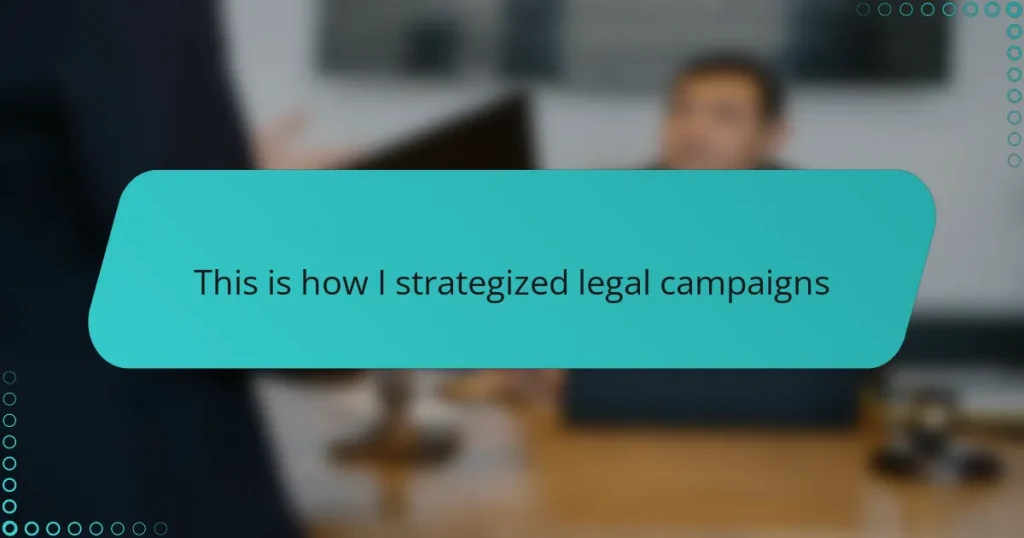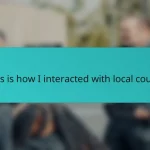Key takeaways
- Effective legal advocacy relies on clear communication, ethical responsibility, and a commitment to clients’ interests, balancing empathy with rigorous analysis.
- Successful legal campaigns require a clear objective, understanding the audience, and being adaptable to changing circumstances.
- Measuring success in legal campaigns involves looking beyond immediate outcomes, recognizing quieter victories like public engagement and awareness shifts.
- Listening to stakeholders, building genuine alliances, and being open about challenges can lead to innovative solutions and align team efforts towards a common goal.
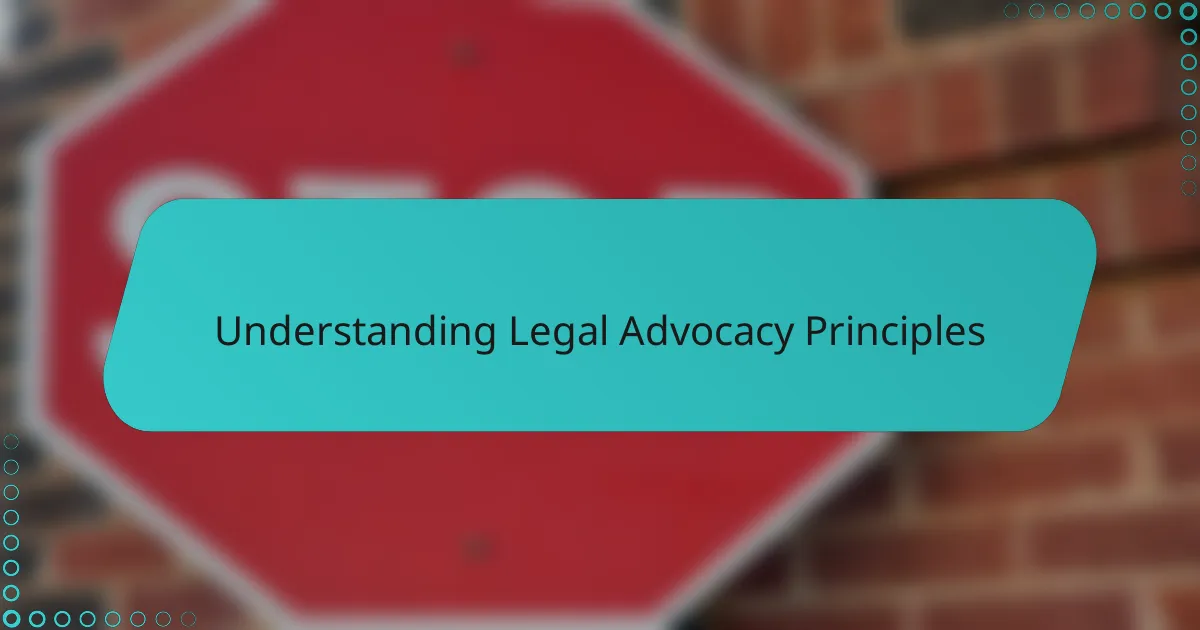
Understanding legal advocacy principles
Grasping the core of legal advocacy means more to me than just knowing laws; it’s about truly understanding the principles that drive justice forward. Have you ever felt that moment when a well-placed argument not only supports a case but also stands for fairness? That’s when legal advocacy becomes a powerful tool for change.
In my experience, these principles revolve around clear communication, ethical responsibility, and unwavering commitment to the client’s best interest. Balancing empathy with rigorous analysis often feels like walking a tightrope, but it’s this balance that makes our advocacy effective and authentic.
I often reflect on how foundational these principles are when a case feels particularly challenging. They guide my every decision, reminding me that at the heart of legal work lies a deeper mission—giving voice to those who need it most. Do you find that anchoring yourself in these values changes the way you approach legal challenges?
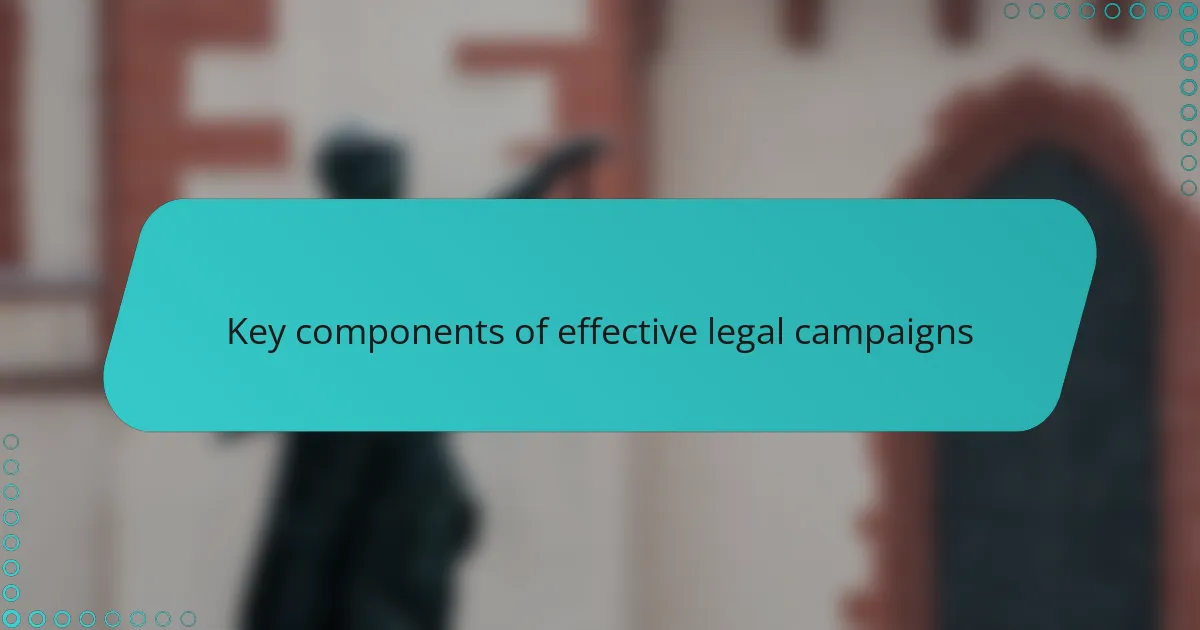
Key components of effective legal campaigns
Crafting an effective legal campaign always starts with pinpointing a clear and compelling objective. I remember once working on a case where clarity in our goals transformed a muddled effort into a focused movement—without that, the message just doesn’t resonate. Have you noticed how a well-defined purpose can turn scattered energy into unstoppable momentum?
Next, identifying your audience is crucial. In my campaigns, tailoring the message to those who hold influence or can generate public support made all the difference. It’s like having a conversation: if you don’t know who’s listening, your words might fall flat. Have you ever tried explaining something important only to realize you weren’t speaking their language?
Finally, timing and adaptability shape the success of any campaign. I’ve learned that being flexible—ready to shift tactics when new information emerges—keeps the campaign alive and effective. Isn’t it fascinating how a legal battle can pivot not just with law but with strategy? These components together create the backbone of a campaign that truly makes an impact.
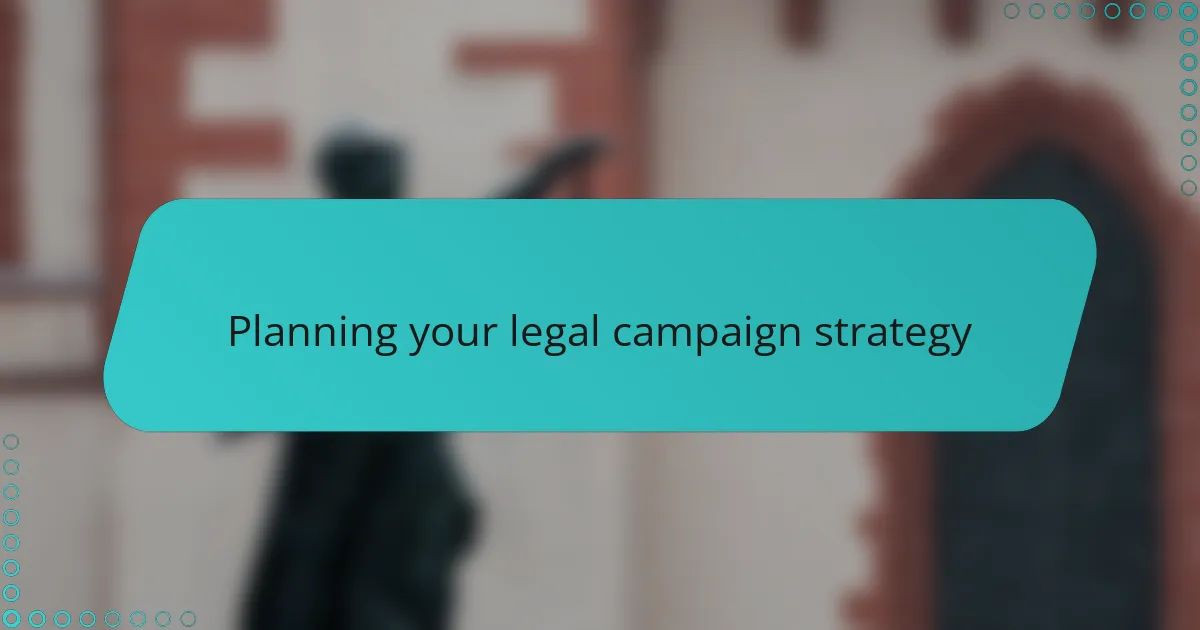
Planning your legal campaign strategy
Planning your legal campaign strategy starts with mapping out every step, much like preparing for a long journey. I recall a campaign where neglecting this stage meant scrambling later, which was a lesson in how crucial foresight is. Have you ever underestimated how much clarity up front saves headaches down the line?
One thing I always emphasize is setting realistic milestones. Breaking the campaign into manageable phases not only keeps the team motivated but also helps measure progress clearly. When you see small wins accumulating, doesn’t it feel like the momentum is truly building?
Another vital part of strategy is anticipating obstacles. I often think, “What could go wrong here?” and develop backup plans accordingly. That mindset has saved campaigns from stalling when unexpected challenges arise. Isn’t preparation the best way to stay confident amidst uncertainty?
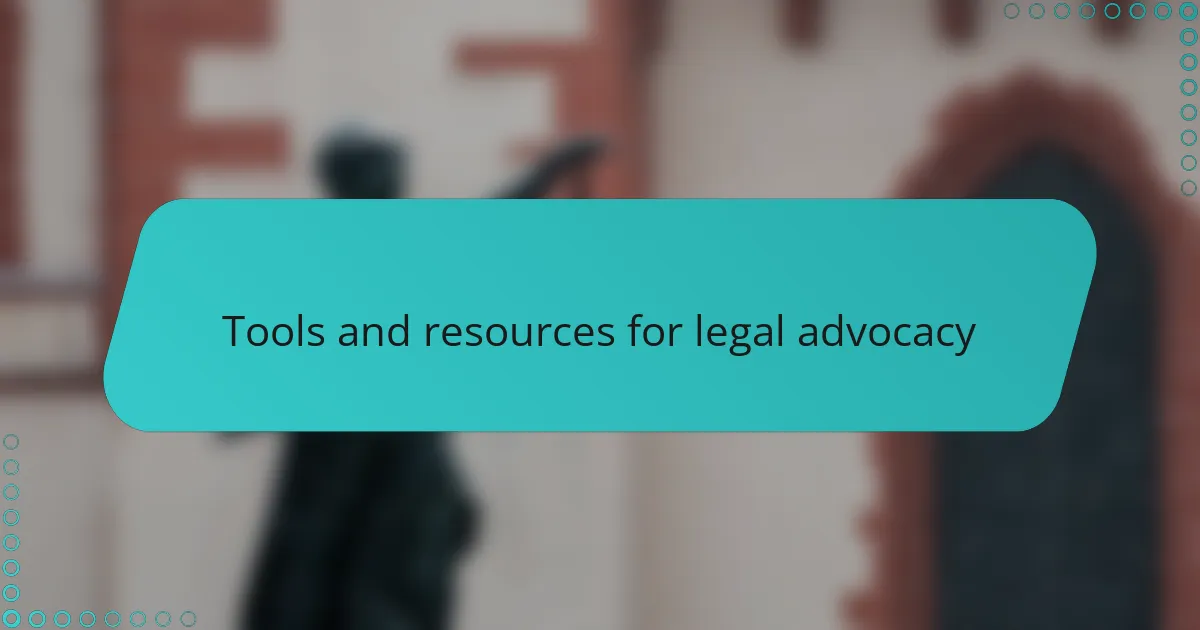
Tools and resources for legal advocacy
When it comes to tools and resources for legal advocacy, I’ve found that having the right digital platforms can be a game-changer. Tools like case management software and collaborative document editors not only keep things organized but also help streamline communication across teams. Have you ever experienced how a single shared document can save hours of back-and-forth emails?
Beyond technology, I rely heavily on legal databases and research platforms that provide up-to-date statutes and case law. It’s like having a constantly refreshed library at your fingertips. Without these resources, I’ve noticed how easy it is to miss crucial legal precedents that could strengthen a campaign.
I also can’t stress enough the value of community networks and mentorship in legal advocacy. Connecting with experienced advocates has often given me insights I couldn’t find in textbooks or online. Don’t you think that learning from those who’ve walked the path before truly elevates how we craft and implement our strategies?
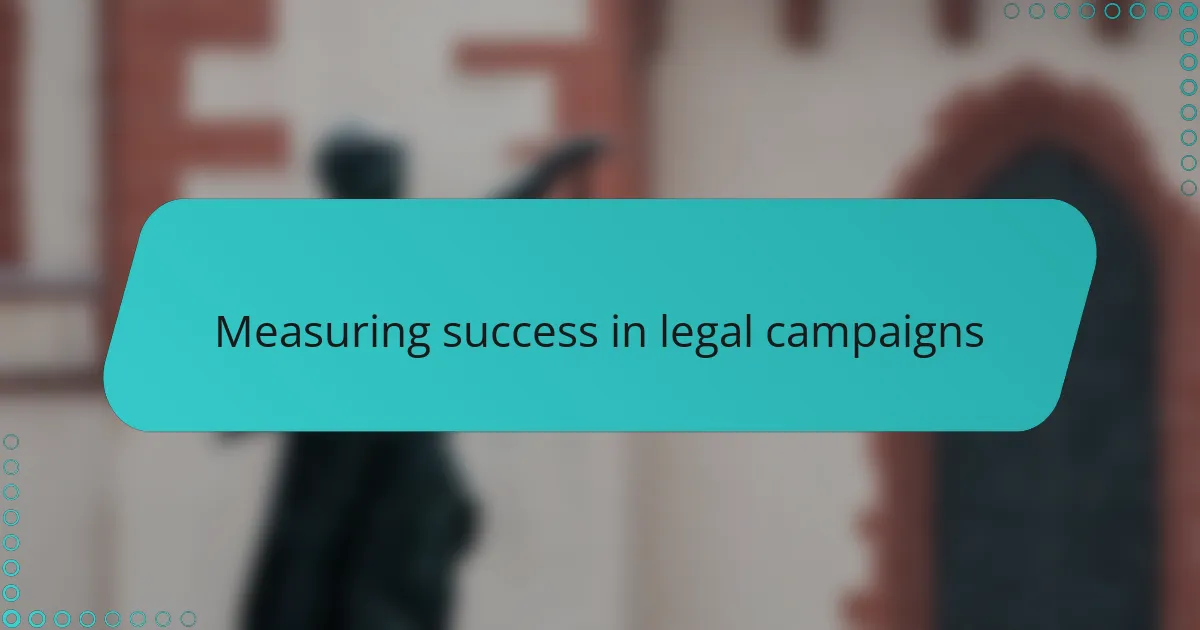
Measuring success in legal campaigns
Measuring success in legal campaigns often feels less straightforward than tracking sales or clicks. For me, it’s about looking beyond the obvious outcomes—did the law change, or did the case win? Sometimes, success is found in the quieter victories, like shifting public opinion or empowering marginalized voices. Have you ever felt that subtle sense of progress that doesn’t show up on paper but changes everything?
I remember a campaign where our initial goal was legal reform, but along the way, we realized raising awareness was just as crucial. We started tracking community engagement and media coverage as indicators of momentum—metrics that weren’t traditional but told us we were moving the needle. Isn’t it fascinating how success can be multi-dimensional, requiring us to redefine what winning looks like?
At the heart of it, I believe setting clear, measurable benchmarks early keeps both the team grounded and motivated. Without them, how do you know when to pivot or push harder? Reflecting on this has taught me that consistent evaluation, combined with flexibility, transforms campaigns from good intentions into tangible impact.
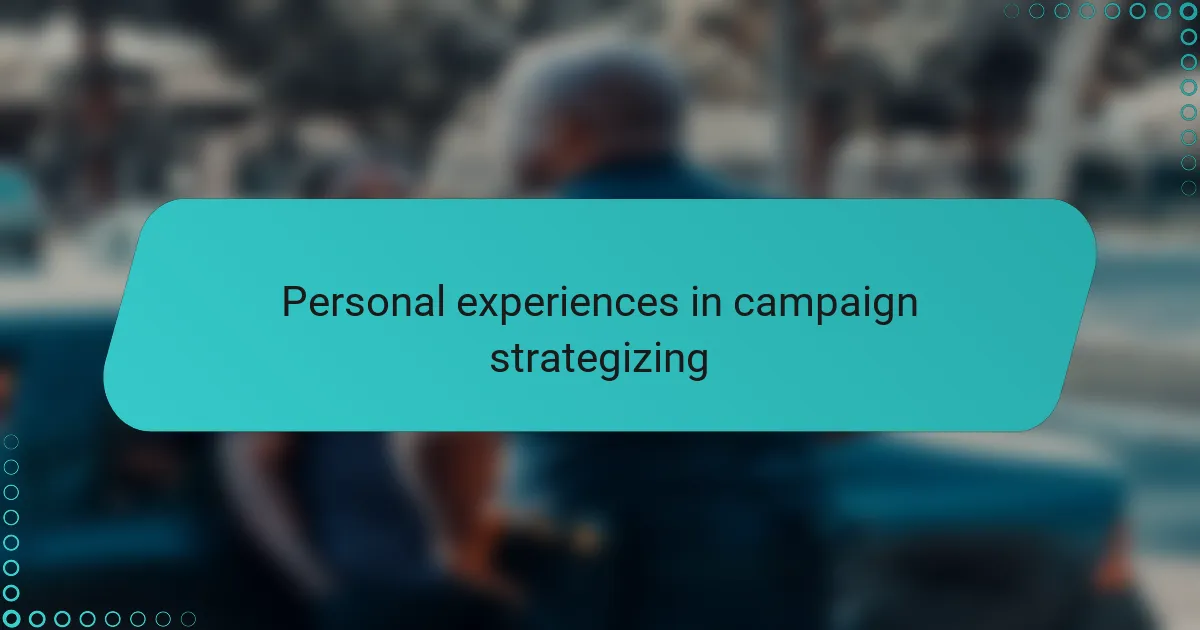
Personal experiences in campaign strategizing
One of the most eye-opening moments I had in strategizing legal campaigns was realizing how much listening shapes the entire process. Early on, I thought having the strongest arguments was enough, but I learned that truly understanding the needs and emotions of those affected made every step more focused and heartfelt. Have you ever noticed how deep listening changes the way you approach a challenge?
I also remember a time when a campaign’s momentum stalled because we hadn’t fully engaged all stakeholders from the start. That experience taught me the importance of building genuine alliances, not just ticking boxes on a checklist. It’s more than coordination—it’s about cultivating trust that fuels collective drive. Doesn’t it feel different when everyone’s energy is aligned behind a cause?
Sometimes, the most powerful breakthroughs came from moments of vulnerability—sharing doubts or unexpected setbacks with the team. Opening up created space for fresh perspectives and innovative thinking that no rigid plan could predict. Have you found that honest conversations often spark the best ideas, even in high-stakes situations?
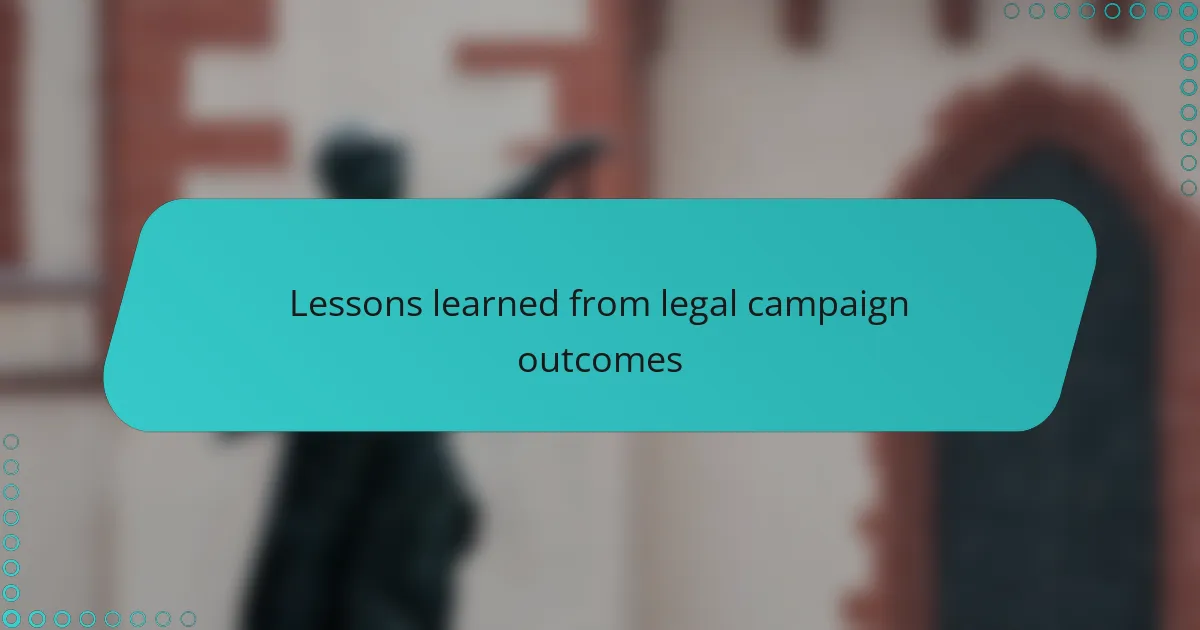
Lessons learned from legal campaign outcomes
I’ve learned that outcomes, whether victories or setbacks, always carry lessons that shape future campaigns. For example, after one case didn’t achieve the legal reform we hoped for, I realized that shifting public perception was a significant win in itself—sometimes progress isn’t immediate but builds in layers. Have you noticed how reframing what success looks like can energize your next steps?
Another insight came from seeing how rigid strategies sometimes falter against real-world complexities. In one campaign, we clung too tightly to our original plan and missed cues from emerging community voices. That experience taught me to remain adaptable and listen continuously, because outcomes often reveal where our assumptions fell short. Isn’t it humbling when results teach us more than our initial intentions?
Finally, I’ve found that documenting what worked—and what didn’t—is invaluable. Reflecting honestly on each outcome helps me fine-tune not just tactics, but the very mindset behind the campaign. It’s like having a compass that recalibrates after every journey, guiding future efforts with greater clarity. Do you take time to pause and dissect your campaign results before charging ahead?
